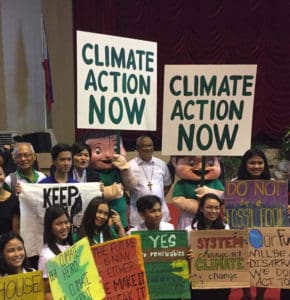“We know that all creation is groaning in labor pains even until now; and not only that … we also groan within ourselves as we wait for adoption, the redemption of our bodies”
(Romans 8:22-23)
In his message for the World Day of Peace in 1990, St. John Paul II insisted that the environment should be our common concern, and that this concern has an essential moral and religious dimension. There he also pointed out that care for the earth and the call to ecological conversion should be treated as an urgent issue in the Church.
We are to take the advocacy for a sustainable ecology seriously because it is an integral aspect of our responsibility as Christians. He said, “Christians, in particular, realize that their responsibility within creation and their duty towards nature and the Creator are an essential part of their faith.”
Today, guided by Pope Francis’ encyclical, Laudato Si’, we again call on everyone to care for the earth and for the poor and embrace ‘integral ecology’ for the sake of our common home. We have to act in order to be able to stop the deterioration of our planet. United in our commitment to the Universal Church, and truly convinced that integral ecology is inseparable from an integral society, we make a definitive pledge to respond to the climate crisis—securing a sustainable future for our people and our planet.
We recall again the message of our Pastoral Letter in 1988: “Our faith tells us that Christ is the center point of human history and creation. All the rich unfolding of the universe and the emergence and flowering of life on Earth are centered on him. (Eph. 1:9-10; Col 1:16-17). The destruction of any part of creation, especially, the extinction of species defaces the image of Christ which is etched in creation.”
For our continuing reflection, we also commit to celebrate the Season of Creation as a way of integrating our ecological advocacy to our prayer and liturgical life as urged by the Pastoral Statement of the CBCP Permanent Council in 2003.

As your pastors, we call for a continuing ecological conversion in all our Metropolitan Provinces, Dioceses, Parishes and Basic Ecclesial Communities — to discern the issues and actively care for the earth in personal, communitarian and institutional levels. The voices of faith must be an indispensable part of our continuing efforts at framing the agenda for collaborative ethical action.
Therefore, we in the Church, consistently caring for our common home, commit to abide by the following ecological convictions: The Earth is our home. We are to care for our common home. We are to act in order to protect all life forms on Earth, from the ridge to reef.
Even while we dream of the fullness of life in the hereafter, our Lord teaches us to let His kingdom come and His will be done, “on earth as it is in heaven” – meaning, already in the here and now. We are, therefore, duty-bound to act and resist all forms of destruction damaging our people and our planet.
We are connected to the Earth, just as our lives and the life of all other beings are interconnected with each other.
We hear both the cry of the Earth and the cry of the Poor. We are to respond and act together in order to mitigate the ill effects of climate change on our planet and our communities; and in the spirit of accountability, we demand climate justice.
Concretely, we call upon the dioceses to implement that decree in the Second Plenary Council of the Philippines, which categorically calls for the setting up “an ecology desk in social action centers” that would make ecology their special concern.[1]
And spearheaded issues by our revitalized ecology programs in our diocesan and parish ministries, we commit to live the spirit and principles of Laudato Si’ through the following concrete ecological actions: Integrate the care of creation as our common home in our teaching and practice of Christian discipleship. (Psalm 8:4-9)
Live simply, minimize consumption and actively promote ecological awareness and action through integral waste segregation and by minimizing the use of plastic and paper, by eliminating single-use plastics, polystyrene and the like, from our homes and institutions.
Prevent and reduce biodiversity loss by growing indigenous plants and trees, expanding forests through rain forestation, resisting destructive mining, dirty energy, the unbridled construction of roads and dams, as well as projects that cut into forested and protected areas. Implement programs that will allow the growth and recovery of forests, ecosystems and biodiversity.
Promote diversified and sustainable agriculture. Avoid the genetically modified agricultural products propagated in plantations and monoculture production, which destroy biodiversity and threaten indigenous lands.
Participate in efforts to protect and preserve our seas, oceans and fishery resources.
Protect our watersheds while at the same time using freshwater wisely, promoting and establishing massive rainwater collection, and putting a stop to infrastructures that can be detrimental to the preservation of ecological balance and biodiversity.
Push for an immediate transition to safe, clean, and affordable energy. Ensure just and fair transition to renewable energy sources and reject false solutions; support the use of solar power in our homes and institutions (dioceses, churches, schools, seminaries); promote, advocate and invest in renewable energy (solar, hydro, wind and geothermal power); join the campaign to immediately phase out coal-fired power plants and all other plants dependent on fossil-fuel, including coal mining.
Do not allow the financial resources of our Catholic institutions to be invested in favor of coal-fired power plants, mining companies and other destructive extractive projects. Divestment from such investment portfolios must be encouraged.
Integrate Laudato Si’ in the curriculum and strategic plans of Catholic educational institutions including seminaries and religious formations. Popularize and integrate the understanding of climate change and its mitigation in our formation programs.
 Organize and educate people into a well-informed and empowered citizenry using all means available including mainstream and social media platforms for the passage of into law of bills aimed at protecting our common home, such as the Rights of Nature Bill, Forest Resources Bill and Alternative Minerals Mining Bill, and National Land Use Bill, as well as the implementation of environmental laws, such as, the Clean Air Act, Clean Water Act, and the Ecological Solid Waste Management Act. In the initiatives to amend the 1987 Constitution, any move that poses a threat to the integrity of creation, justice and peace, should be opposed.
Organize and educate people into a well-informed and empowered citizenry using all means available including mainstream and social media platforms for the passage of into law of bills aimed at protecting our common home, such as the Rights of Nature Bill, Forest Resources Bill and Alternative Minerals Mining Bill, and National Land Use Bill, as well as the implementation of environmental laws, such as, the Clean Air Act, Clean Water Act, and the Ecological Solid Waste Management Act. In the initiatives to amend the 1987 Constitution, any move that poses a threat to the integrity of creation, justice and peace, should be opposed.
Network with international bodies to create a groundswell of worldwide pressure powerful enough to convince multinational institutions to lower emissions and to actively engage in environmental actions for the protection of our common home and on behalf of the poor who are most threatened by aggressive but irresponsible industries.
Respect, recognize, and support the rights of indigenous peoples in protecting their ancestral domains and promoting sustainable development.
Strengthen adaptation measures and disaster risk management and reduction for our vulnerable communities. Advocate the prioritization of government budget allocation for climate-resilient adaptation programs.
We, in the Philippine Church, are one with the Holy Father in pursuing common agenda to protect our fragile ecosystem from the threat of the continuing ecological crisis. We have the moral imperative to act together decisively in order to save our common home. This is our Christian duty and responsibility.
For the Church, the faith-based organizations (FBOs), our partners in the government and civil society organizations, living Laudato Si’ is an urgent challenge and invitation. We conclude by sharing the optimism of Pope Francis: “Humanity still has the ability to work together in building our common home…. All is not lost. Human beings, while capable of the worst, are also capable of rising above themselves, choosing again what is good and making a new start” (LS, 13, 205).
Indeed, “Blessed are those who protect and care for our common home!” (From the ‘New Beatitudes of Pope Francis’)
Let us be one in prayer, confident that “God, who calls us to generous commitment and to give him our all, offers us the light and strength needed to continue on our way.” (LS 245)
For the Catholic Bishops’ Conference of the Philippines:
+ ROMULO G. VALLES, D.D. Archbishop of Davao
CBCP President
16 July 2019
[1] Acts and Decrees of the 2nd Plenary Council of the Philippines, Part IV, Title VI, Section 4, Article 31




